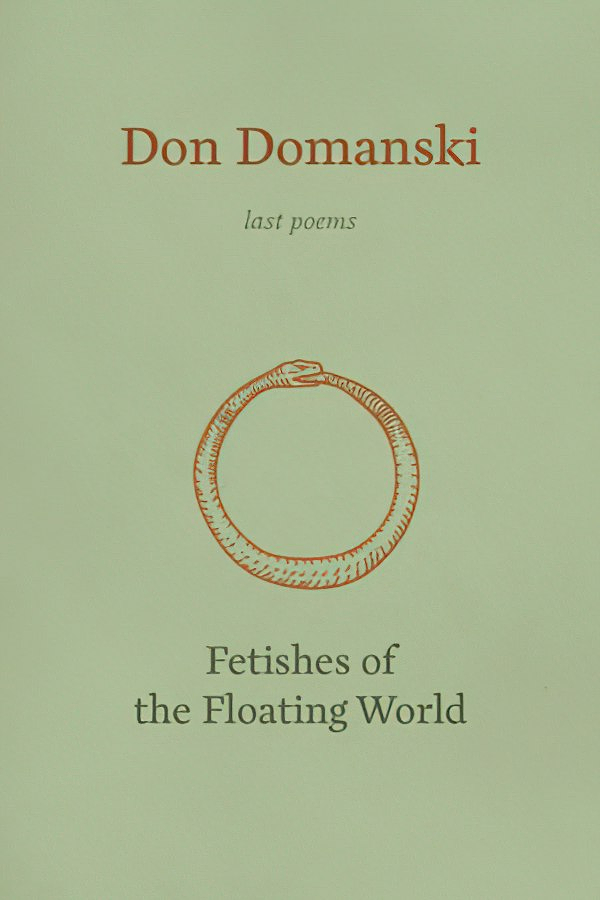50th Anniversary, Blog
Brick Books 50th Anniversary: Brilliant and Timeless Books to Take Another Look At—Fetishes of the Floating World
We’re delighted to continue our 50th anniversary series this month with Don Domanski’s Fetishes of the Floating World. This months blog post is written by Colleen Coco Collins.
Fetishes of the Floating World
by Colleen Coco Collins
“when I lie down my head/ what will hold me in my rabbit-sleep”
This is the last line gifted us in Dom Domanski’s Fetishes of the Floating World. These beautiful poems—like the hares populating them—lie down ever only in a sleep vigilantly unhemispheric: edgeless, straddling wake and dream, but fully blooded and fully visioned. These are crepuscular works: penumbral animals scending the littoral of consciousness and trawling the hypnagogic; blooming hypnopompic in the Venn territories of harbingers and portents. Domanski’s evocative language vibrates in adoration of the high sensorial. It speaks to experiences of sonder, and at once to disembodiment and the uber-haptic: “I crawled about/ looking for my body/ each movement obtained/ by negation by an apophatic resurfacing.”
Through this language, we’re arrived at revelatory moments rapid-fluxing the spectral-come-ubiquitous. And it is this scroll of the mundane (“just out of sight Tuesday waits to be known’) through the mysto-cryptic (“this is the longhand of holy writ/ rising from the gloaming”) that shapes Domanski’s summed-yet-faceted takes with brilliance and tenderness. The whole world, really, is here shaped, though as seen through an extraordinary gowpen of compassion and a nature-slanted lens. Domanski’s poetic umwelt wriggles and writhes, shivering descriptive lengths along the grave shoulders of night roads, scaffolding vivid architectures by means of subtle assonances, and evoking gestural alacrity. And it stills too, in long glorious moments of clarified macro-observation.
In this deft text, the whole of the frame of the scene is considered, with special attention given to the peripheral and marginal. In these poetic constructions, signals in the compositional dusk hocket between what exists and what is mused.
The figures in these poems—human and non-human alike—range the territories of griefs and joys, skirting and skimming luminously the sentient experience. These are operators revelling in the poetic ken. These are alchemies and mists; are as night pollinators enhaloing pulsing bulbs of meaning. They tumult and graze—bravely, and then with real chary—that which “pillows fear/ just at the back of our heads.”
Domanski has long made a study of the tapetum lucidum of poems; of the reflective qualities of small bodies, imprinting moments, flitting contentions and expansive chaos. And in this, of the limn of a thing, and of the specific conveying qualities of the outline/ the silhouette/ the implication (these qualities being the speakings of things; the sidelong, and all that stands outside the deliveries of trad language). Stones ripple, moonlight moves along papered walls; apple seeds float by; much puddles. All strain in emphatic communication, both concrete and esoteric, celebrating the seeming ineffable. “[J]ust beyond language is where the keening starts,” Domanski us recalls, and seems to suggest that weighty inhabitation and spirited recount are more elucidating and containering—more mnemonically retaining—than all the 4k focus available to us in arch descriptive tracts. And that the caoine—or wail—is permission to call and oscillate between states.
These porous borders and caoines resonate especially given how skillfully these poems work across planes and labour over borders, climbing and trellising… There is a duty here to investigate the midden. To pin no live specimen, but rather to report on live-ness from a state of live-ness, which necessarily includes somnambulance, and stupor and awe and death. [—Domanski was a fossil collector, though seemingly one taken with the fossil as best proximate of the most fantastic living-ed thing—]
These poems are too fantastic living things; are missives of cajole and conviction, their phrases shards and refractions written in the dewy quiet, signifying nothing/signifying all.
As in:
“a rabbit comes to drink at the shore”
I felt the zoom in/pull out whoosh of all and naught as I read these final compositions (this is the last book Domanski wrote) by candlelight when the power whimpered out one wet spring night along the Minas Basin coast where I live, and of which Domanski herein wrote. The regular sea below me, aggravating the coastal road, was unbothered, shelving and editing the old stones of the shore. I read Domanski’s lines, his old-stone hefting; and his feet, and weights, and meters. And fathoms. And made my way through his coruscates of meaning; through the darks they ribboned; felt along the tethers of these vistal documents of love and thought toward an “alder grove” of poetics. That has here for a foot all one watery root.
“[A] water boatman sculls across pondswell/ I know its dark grace could carry the world/ I know when it dies no hearts will ache/ no heads will turn.”
This book—this vessel poetic—lees and yars and drifts; runs aground. Banks by accident. Inscribes the tale along the dark shore; incants, annunciates, quips.
Wobbles, and lifts.
The sculling boatman is always missed.
Read this in all lights and
in all weathers.
Get Your Copy Today – Save 25%
Order your copy of Fetishes of the Floating World before September 30, 2025 and save 25% off the cover price.
Buy NowPart of the Don Domanski Bundle
The Brick Books Don Domanski Bundle includes Fetishes of the Floating World, All Our Wonder Unavenged, and Bite Down Little Whisper. Available now at 33% off.
Buy The Don Domanski BundleAbout Don Domanski
Don Domanski (1950–2020) was born and raised in Sydney, on Cape Breton Island, Nova Scotia, Canada. He lived briefly in Toronto, Vancouver and Wolfville, before settling in Halifax, Nova Scotia, where he lived for most of his life. Author of nine collections of poetry, his work is infused with a deep and abiding interest in mythology, religion and esoteric philosophy, and has been translated into Arabic, Chinese, Czech, French, Portuguese and Spanish.
He mentored other poets through the Banff Centre for the Arts Wired Writing Studio and the Writers’ Federation of Nova Scotia Mentorship program. Also a visual artist, his work often appeared on the covers of his books. He collected fossils for many years, before turning his attention to meteorites and Stone Age tools. He is credited with discovering the neural arch of a 350-million-year-old (Lower Carboniferous) amphibian previously thought to have gone extinct in the Devonian period.
His poetry collections Wolf-Ladder (1991) and Stations of the Left Hand (1994) were shortlisted for the Governor General’s Award for Poetry, and in 1999 he received the Canadian Literary Award for Poetry from the Canadian Broadcasting Corporation. All Our Wonder Unavenged (2007) was honoured with the Governor General’s Award, the Lieutenant Governor of Nova Scotia Masterworks Award, and the Atlantic Poetry Prize, and Bite Down Little Whisper (2013) won the J.M. Abraham Poetry Award.
Nourish Your Poetic Spirit – With a Brick Books annual subscription, you receive every title we publish before they’re available anywhere else, plus exclusive subscriber perks all while supporting authors and helping to hold a place for poetry in Canada and the world.
Subscribe today.



